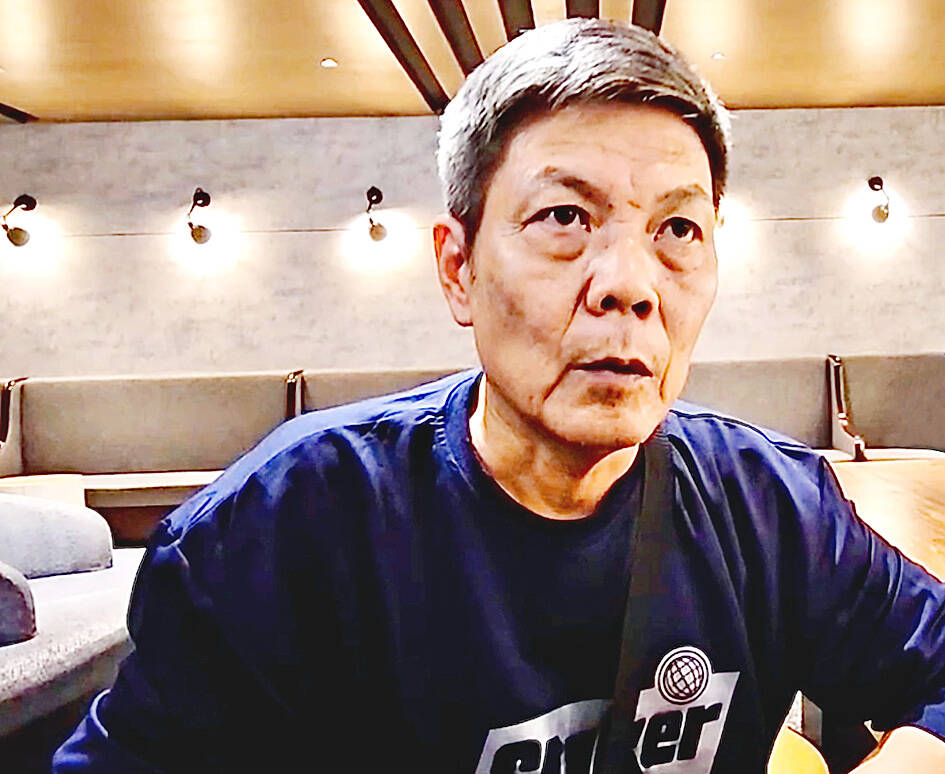A Chinese dissident who was stuck inside a transit area in Taiwan Taoyuan International Airport after he refused to fly on to China yesterday said he has arrived in Canada after being granted asylum.
Chen Siming (陳思明) arrived in Taiwan on Sept. 22 after traveling through Thailand and Laos. When he landed at Taoyuan airport he refused to reboard, asking for assistance to resettle in a third country.
He spent almost two weeks living in the transit area and immigration office of the airport, where he said he was looked after by authorities.

Photo courtesy of a reader
There was concern about how long he would be there, after a similar case in late 2018 saw two dissidents spend four months at Taoyuan airport.
Chen said that he had arrived in Vancouver on Saturday.
“I was able to successfully obtain political asylum in Canada,” he said, crediting the international attention his case received and various rights groups, as well as the governments of Taiwan and Canada, and the UN High Commissioner for Refugees (UNHCR).
“The three parties handled my case quickly in the spirit of humanitarian care,” he said. “This kindness will be remembered forever. I would like to express my sincere gratitude.”
Chen is a known activist in China who regularly commemorated the Tiananmen Square Massacre of June 4, 1989, and has been repeatedly detained around the anniversary.
He fled China for Laos in late July, but after human rights lawyer Lu Siwei (盧思位) was arrested in the country and deported, Chen was advised to leave.
He arrived in Thailand, where he said he was granted interim asylum status by the UNHCR, before booking a flight to Guangzhou, China, which transited in Taiwan.
Dissident and political commentator Guo Baoshen (郭寶勝), who had been assisting Chen, said Chen was “very lucky” to have been transferred so quickly.
In late 2018, Yan Bojun (顏伯鈞) and Liu Xinglian (劉興聯) spent about 100 days in Taoyuan airport before Taiwan authorities said they could enter, but only after they flew to Singapore and then returned on short-term humanitarian visas.
Taiwan does not have a formal refugee pathway, and tensions between Taipei and Beijing — which has vowed to annex Taiwan — make the topic of Chinese asylum seekers a politically sensitive and complicated issue.

The brilliant blue waters, thick foliage and bucolic atmosphere on this seemingly idyllic archipelago deep in the Pacific Ocean belie the key role it now plays in a titanic geopolitical struggle. Palau is again on the front line as China, and the US and its allies prepare their forces in an intensifying contest for control over the Asia-Pacific region. The democratic nation of just 17,000 people hosts US-controlled airstrips and soon-to-be-completed radar installations that the US military describes as “critical” to monitoring vast swathes of water and airspace. It is also a key piece of the second island chain, a string of

A magnitude 5.9 earthquake that struck about 33km off the coast of Hualien City was the "main shock" in a series of quakes in the area, with aftershocks expected over the next three days, the Central Weather Administration (CWA) said yesterday. Prior to the magnitude 5.9 quake shaking most of Taiwan at 6:53pm yesterday, six other earthquakes stronger than a magnitude of 4, starting with a magnitude 5.5 quake at 6:09pm, occurred in the area. CWA Seismological Center Director Wu Chien-fu (吳健富) confirmed that the quakes were all part of the same series and that the magnitude 5.5 temblor was

Taiwan will now have four additional national holidays after the Legislative Yuan passed an amendment today, which also made Labor Day a national holiday for all sectors. The Chinese Nationalist Party (KMT) and Taiwan People’s Party (TPP) used their majority in the Legislative Yuan to pass the amendment to the Act on Implementing Memorial Days and State Holidays (紀念日及節日實施辦法), which the parties jointly proposed, in its third and final reading today. The legislature passed the bill to amend the act, which is currently enforced administratively, raising it to the legal level. The new legislation recognizes Confucius’ birthday on Sept. 28, the

The Central Weather Administration has issued a heat alert for southeastern Taiwan, warning of temperatures as high as 36°C today, while alerting some coastal areas of strong winds later in the day. Kaohsiung’s Neimen District (內門) and Pingtung County’s Neipu Township (內埔) are under an orange heat alert, which warns of temperatures as high as 36°C for three consecutive days, the CWA said, citing southwest winds. The heat would also extend to Tainan’s Nansi (楠西) and Yujing (玉井) districts, as well as Pingtung’s Gaoshu (高樹), Yanpu (鹽埔) and Majia (瑪家) townships, it said, forecasting highs of up to 36°C in those areas